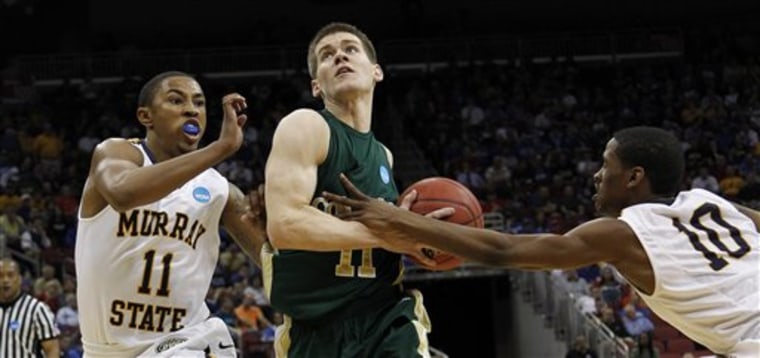Whether it's the mascots, team colors, or the cool uniforms, everyone wants an edge in filling out their NCAA tournament brackets. And it seems like every year someone comes up with a new formula to predict winning teams.
This year, one expert says he doesn't care how well the teams played during the regular season, all he cares about is how the teams are seeded by the NCAA.
Meanwhile, a Harvard student has put his study time to good use, figuring out a computer model to predict which teams will get upset in the first two rounds of the tourney based on this season's rebounds, turnovers and RPI, a measure of a teams' strength of schedule.
Both are using the logic of mathematics and statistics to predict what many of us think of as a magical tournament of small-conference Davids beating big-school Goliaths, and the possibility of seeing upset-minded Cinderellas dancing at the Final Four.
For University of Illinois Champaign-Urbana computer scientist Sheldon Jacobson, the 68-team NCAA basketball championship is a numbers problem begging to be solved.
"Of course I like basketball being at a Big-10 school," said Jacobson, "but this is really a cornucopia of excitement for the mathematically inclined."
Jacobson is an expert in complex systems that involve humans and technology. He figures out the best way to design aviation security systems or how cellphone use affects traffic accident rates. But for the past few springs, Jacobson has come up with his own science of bracketology, even though he doesn't really make his own picks.
He's looked at win-loss data back to 1985 and has come up with some interesting recommendations. First, don't pick all number ones to reach the Final Four. In fact, it's seven times more likely the Final Four will have zero number one seeds than all four.
Don't go too far the other way either. The odds that a 15th or 16th seeded team will reach the final four is 304-to-1. He says that by the time the "Elite Eight" teams are selected, their prior records or seedings are irrelevant.
"You might as well flip a coin," Jacobson said.
Click here to see more of Jacobson NCAA algorithm, Bracketodds.
NEWS: Lin-Sanity: What's Behind the Phenom?
As for his own picks?
"I don't do a bracket," Jacobson said. "I'm not interested in the teams, I want to know the number of seeds in each round. I recommend people put together their bracket before they see the (names of the) teams."
At Harvard, John Ezekowitz says he can predict likely upset winners in the first two rounds. Last year, he was three for three. This year, he says there's a better than 50 percent chance of upsets by Virginia Commonwealth University, North Carolina State, California and Ohio in the first two rounds. (Although last night California lost badly in the play-in round of the tournament.)
Ezekowitz is a junior economics major and a member of the Harvard College Sports Analysis Collective, a club of 40 to 50 undergraduates who meet monthly to quantitatively analyze sports using statistics and math. In addition to the NCAA tournament, they're tackling the wisdom of NFL draft picks.
Ezekowitz's upset model can be found here.
Ezekowitz cautions that his model isn't perfect.
"The big caveat with VCU is turnover numbers," Ezekowitz said. They force more turnovers and don't turn the ball over themselves. They're an outlier and so the model might be overestimating their chances of winning."
